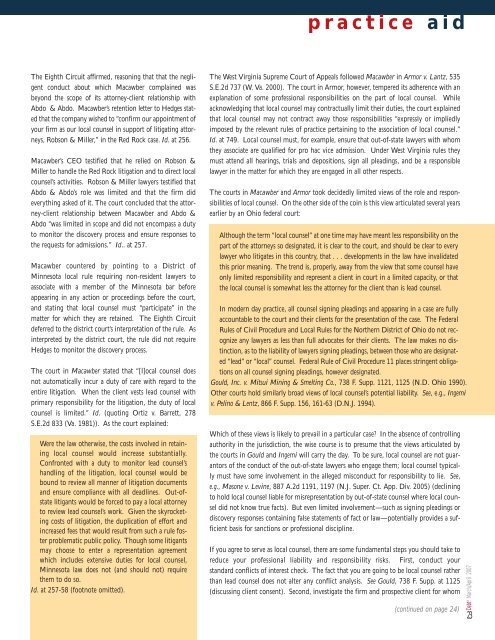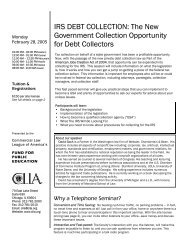leading the way - Commercial Law League Of America
leading the way - Commercial Law League Of America
leading the way - Commercial Law League Of America
You also want an ePaper? Increase the reach of your titles
YUMPU automatically turns print PDFs into web optimized ePapers that Google loves.
practice aid<br />
The Eighth Circuit affirmed, reasoning that that <strong>the</strong> negligent<br />
conduct about which Macawber complained was<br />
beyond <strong>the</strong> scope of its attorney-client relationship with<br />
Abdo & Abdo. Macawber’s retention letter to Hedges stated<br />
that <strong>the</strong> company wished to “confirm our appointment of<br />
your firm as our local counsel in support of litigating attorneys,<br />
Robson & Miller,” in <strong>the</strong> Red Rock case. Id. at 256.<br />
Macawber’s CEO testified that he relied on Robson &<br />
Miller to handle <strong>the</strong> Red Rock litigation and to direct local<br />
counsel’s activities. Robson & Miller lawyers testified that<br />
Abdo & Abdo’s role was limited and that <strong>the</strong> firm did<br />
everything asked of it. The court concluded that <strong>the</strong> attorney-client<br />
relationship between Macawber and Abdo &<br />
Abdo “was limited in scope and did not encompass a duty<br />
to monitor <strong>the</strong> discovery process and ensure responses to<br />
<strong>the</strong> requests for admissions.” Id.. at 257.<br />
Macawber countered by pointing to a District of<br />
Minnesota local rule requiring non-resident lawyers to<br />
associate with a member of <strong>the</strong> Minnesota bar before<br />
appearing in any action or proceedings before <strong>the</strong> court,<br />
and stating that local counsel must “participate” in <strong>the</strong><br />
matter for which <strong>the</strong>y are retained. The Eighth Circuit<br />
deferred to <strong>the</strong> district court’s interpretation of <strong>the</strong> rule. As<br />
interpreted by <strong>the</strong> district court, <strong>the</strong> rule did not require<br />
Hedges to monitor <strong>the</strong> discovery process.<br />
The court in Macawber stated that “[l]ocal counsel does<br />
not automatically incur a duty of care with regard to <strong>the</strong><br />
entire litigation. When <strong>the</strong> client vests lead counsel with<br />
primary responsibility for <strong>the</strong> litigation, <strong>the</strong> duty of local<br />
counsel is limited.” Id. (quoting Ortiz v. Barrett, 278<br />
S.E.2d 833 (Va. 1981)). As <strong>the</strong> court explained:<br />
Were <strong>the</strong> law o<strong>the</strong>rwise, <strong>the</strong> costs involved in retaining<br />
local counsel would increase substantially.<br />
Confronted with a duty to monitor lead counsel’s<br />
handling of <strong>the</strong> litigation, local counsel would be<br />
bound to review all manner of litigation documents<br />
and ensure compliance with all deadlines. Out-ofstate<br />
litigants would be forced to pay a local attorney<br />
to review lead counsel’s work. Given <strong>the</strong> skyrocketing<br />
costs of litigation, <strong>the</strong> duplication of effort and<br />
increased fees that would result from such a rule foster<br />
problematic public policy. Though some litigants<br />
may choose to enter a representation agreement<br />
which includes extensive duties for local counsel,<br />
Minnesota law does not (and should not) require<br />
<strong>the</strong>m to do so.<br />
Id. at 257-58 (footnote omitted).<br />
The West Virginia Supreme Court of Appeals followed Macawber in Armor v. Lantz, 535<br />
S.E.2d 737 (W. Va. 2000). The court in Armor, however, tempered its adherence with an<br />
explanation of some professional responsibilities on <strong>the</strong> part of local counsel. While<br />
acknowledging that local counsel may contractually limit <strong>the</strong>ir duties, <strong>the</strong> court explained<br />
that local counsel may not contract a<strong>way</strong> those responsibilities “expressly or impliedly<br />
imposed by <strong>the</strong> relevant rules of practice pertaining to <strong>the</strong> association of local counsel.”<br />
Id. at 749. Local counsel must, for example, ensure that out-of-state lawyers with whom<br />
<strong>the</strong>y associate are qualified for pro hac vice admission. Under West Virginia rules <strong>the</strong>y<br />
must attend all hearings, trials and depositions, sign all p<strong>leading</strong>s, and be a responsible<br />
lawyer in <strong>the</strong> matter for which <strong>the</strong>y are engaged in all o<strong>the</strong>r respects.<br />
The courts in Macawber and Armor took decidedly limited views of <strong>the</strong> role and responsibilities<br />
of local counsel. On <strong>the</strong> o<strong>the</strong>r side of <strong>the</strong> coin is this view articulated several years<br />
earlier by an Ohio federal court:<br />
Although <strong>the</strong> term “local counsel” at one time may have meant less responsibility on <strong>the</strong><br />
part of <strong>the</strong> attorneys so designated, it is clear to <strong>the</strong> court, and should be clear to every<br />
lawyer who litigates in this country, that . . . developments in <strong>the</strong> law have invalidated<br />
this prior meaning. The trend is, properly, a<strong>way</strong> from <strong>the</strong> view that some counsel have<br />
only limited responsibility and represent a client in court in a limited capacity, or that<br />
<strong>the</strong> local counsel is somewhat less <strong>the</strong> attorney for <strong>the</strong> client than is lead counsel.<br />
In modern day practice, all counsel signing p<strong>leading</strong>s and appearing in a case are fully<br />
accountable to <strong>the</strong> court and <strong>the</strong>ir clients for <strong>the</strong> presentation of <strong>the</strong> case. The Federal<br />
Rules of Civil Procedure and Local Rules for <strong>the</strong> Nor<strong>the</strong>rn District of Ohio do not recognize<br />
any lawyers as less than full advocates for <strong>the</strong>ir clients. The law makes no distinction,<br />
as to <strong>the</strong> liability of lawyers signing p<strong>leading</strong>s, between those who are designated<br />
“lead” or “local” counsel. Federal Rule of Civil Procedure 11 places stringent obligations<br />
on all counsel signing p<strong>leading</strong>s, however designated.<br />
Gould, Inc. v. Mitsui Mining & Smelting Co., 738 F. Supp. 1121, 1125 (N.D. Ohio 1990).<br />
O<strong>the</strong>r courts hold similarly broad views of local counsel’s potential liability. See, e.g., Ingemi<br />
v. Pelino & Lentz, 866 F. Supp. 156, 161-63 (D.N.J. 1994).<br />
Which of <strong>the</strong>se views is likely to prevail in a particular case? In <strong>the</strong> absence of controlling<br />
authority in <strong>the</strong> jurisdiction, <strong>the</strong> wise course is to presume that <strong>the</strong> views articulated by<br />
<strong>the</strong> courts in Gould and Ingemi will carry <strong>the</strong> day. To be sure, local counsel are not guarantors<br />
of <strong>the</strong> conduct of <strong>the</strong> out-of-state lawyers who engage <strong>the</strong>m; local counsel typically<br />
must have some involvement in <strong>the</strong> alleged misconduct for responsibility to lie. See,<br />
e.g., Masone v. Levine, 887 A.2d 1191, 1197 (N.J. Super. Ct. App. Div. 2005) (declining<br />
to hold local counsel liable for misrepresentation by out-of-state counsel where local counsel<br />
did not know true facts). But even limited involvement—such as signing p<strong>leading</strong>s or<br />
discovery responses containing false statements of fact or law—potentially provides a sufficient<br />
basis for sanctions or professional discipline.<br />
If you agree to serve as local counsel, <strong>the</strong>re are some fundamental steps you should take to<br />
reduce your professional liability and responsibility risks. First, conduct your<br />
standard conflicts of interest check. The fact that you are going to be local counsel ra<strong>the</strong>r<br />
than lead counsel does not alter any conflict analysis. See Gould, 738 F. Supp. at 1125<br />
(discussing client consent). Second, investigate <strong>the</strong> firm and prospective client for whom<br />
(continued on page 24)<br />
Debt 3 March/April 2007<br />
23















